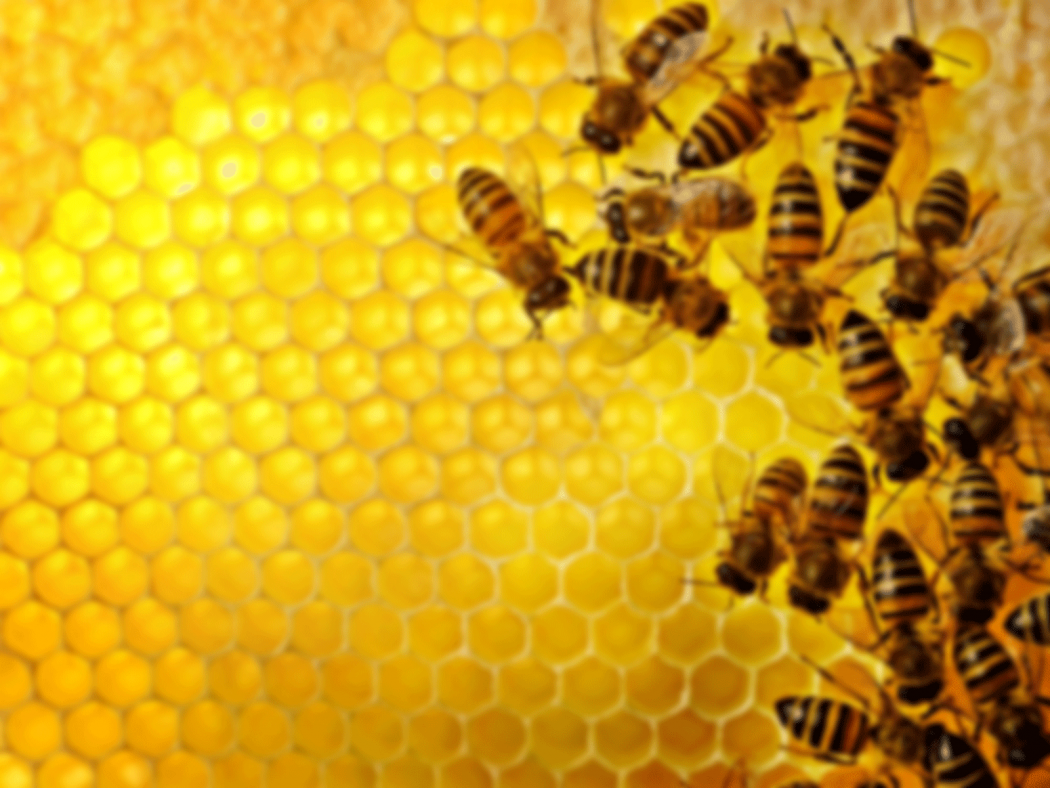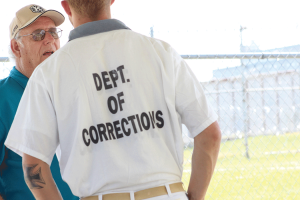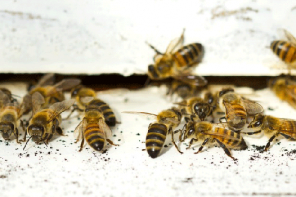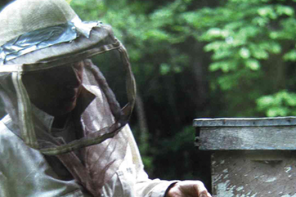By: Jennifer Berry
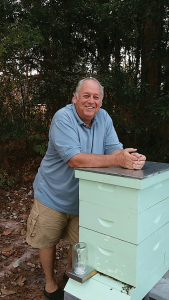 Growing up, some of us wanted to be rich while some of us wanted to be famous. Some of us wanted to fly, and some of us wanted to explore the Milky Way. Some wanted to teach, some wanted to preach. Some wanted to throw, some wanted to catch. Some to stitch and some to sow. Some takers, and some givers. No matter what we wanted to be or whatever we ended up being, the givers are the catalysts that make our world a better place.
Growing up, some of us wanted to be rich while some of us wanted to be famous. Some of us wanted to fly, and some of us wanted to explore the Milky Way. Some wanted to teach, some wanted to preach. Some wanted to throw, some wanted to catch. Some to stitch and some to sow. Some takers, and some givers. No matter what we wanted to be or whatever we ended up being, the givers are the catalysts that make our world a better place.
If you are from our fine state of Georgia and/or have been to a beekeeping meeting here over the years, then I don’t need to introduce you to one of those catalysts, my friend, Clay “Bear” Kelley. You already know him. More than likely, you’ve shaken his hand or have had a conversation with him. But what you may not know is how very interesting Bear Kelley really is. You may not know how big a heart he has. Bear Kelley is the kind of folk that we need, not only in our country, our state, or our neighborhood, but we need him in our beekeeping community as well. I have gotten to know Bear over the years, so let me share part of his story (at least the G-rated version of it).
Before he settled down with his wife, MaryBeth, in Cordele, Georgia, before he had children, before he was “Bear” Kelley, he was Clay, a 17 year old boy just like any other growing up in Florida. The year was 1966, and the Vietnam War was in full swing. Most of the soldiers back then had been drafted, but not Clay. He was young, and he’d had enough of high school and the Florida scenery, so he decided to quit during his junior year. Shortly afterward he joined the Army and found himself in the midst of a very unpopular war. Yet, for almost 30 years, Bear remained loyal to the Armed Forces, eventually retiring as a Chief Warrant Officer 4. Much like our girls in the hive working together for the betterment of the whole, Bear had formed a kinship with his fellow brothers in arms, which he loved. But his service didn’t end there. Not by a long shot.
Bear’s long military career took him all over the world. Along with Vietnam, he served in Korea and Japan, each for five years, as a Logistics Management Advisor. While in Japan and halfway through his military career, he decided it was time to sail around the world. But first, he needed to learn how. He took some classes, and, as soon as he received his Navy Skipper’s License, he bought a 32-foot sailboat. His long jaunts took him from Japan to China, to Korea, and Taiwan, all the while teaching him about navigation, the weather, and the sea. At this point, he told me, he knew for a fact that this was what he wanted to do when he retired. This was where he wanted to be; on the deck of a boat, leisurely letting the currents guide him about. But, like I said, Bear was only halfway through his military career. There were still a few more military assignments he had to finish.
From 1990 to 1992, Bear was the President of the Czech-American Friendship Association while he was stationed in Germany. He was the first American Army Officer since Patton left in 1945 to wear a uniform in the Czech Republic Army after the wall came down. His combat tours included Vietnam two times, the Panama Invasion in 1989, and Desert Storm. He had been wounded three times and received two Bronze Stars and the Cross of Gallantry from Vietnam.
After leaving Asia, Bear served as a Logistics Advisor in the Office of the Secretary of the Army at the Pentagon. While in DC, his living quarters was a 42-foot, 23-ton trawler, which was, as he described, basically a shrimp-style boat with a large haul. “Trawlers are much more comfortable to live on than a skinny sailboat and more fuel-efficient than other cruising vessels.”
He lived on the boat for several years, but the fun didn’t really begin until MaryBeth, his new bride at the time, joined him. Together, they sailed up and down the Eastern seaboard and all around the Atlantic Ocean, popping in and out of sandy coves and islands that were sprinkled across that part of the world. The newlyweds loved this type of lifestyle, and they lived it for almost ten years. But one day while docked in Vera Beach, that all changed. Someone approached them and asked to buy the boat. The two talked it over and decided it was the right price and the right time. They let the boat go and spent the next few weeks figuring out what to do next. Standing still didn’t appeal to either one of them, so, in 2002, they bought a motorhome and toured the U.S. for the next four years.
While touring around the country, the couple decided to stop by various National Parks, one of which was the Cape Hatteras Light House. Even though Bear had “volunteered” for his country, his service to its citizens was far from over. Eventually, he and MaryBeth came to Georgia and volunteered at the SAM Shortline Train. They both loved volunteering there so much that they decided it was time to own some dirt. They bought a home in Cordele, Georgia and have lived there ever since.
But before buying the house and settling down, Bear wasn’t done traveling. On one of his visits to see his son Matt, who lived in North Carolina, Bear was introduced to his first beehives. Matt’s boss kept some hives atop the roof of his home, and Bear couldn’t believe it. They were able to just walk right up to the boxes and not die. How cool was that? “Just standing there, watching them come and go from the fields with the various colors of pollen in their baskets . . . was fascinating.” Bear didn’t know it yet, but the hook was set.
Occasionally, on Bear’s many travels, the thought of beekeeping kept surfacing, but he didn’t think putting bees on a boat or on top of his motorhome was a good idea. It wasn’t until he bought that home in Georgia, a place that wasn’t moving or floating, that Bear decided to begin his adventures in beekeeping and officially become a beekeeper.
About 10 years ago, Bear attended a Heart of Georgia bee meeting. It only took a few visits before he got stung, so to say (or at least, he was about to). He bought a hive, but he knew he still had a lot to learn. He wanted to learn all he could about bees, so he sought out a mentor. One came highly recommended: Jessie McCurdy. If you’ve kept bees in Georgia in the last 40 years, then you know Jessie McCurdy (he’s a legend in his own right).
Bear and Jessie worked a good bit together, but one day in particular stands out in Bear’s mind. It was a hot and humid day (which, for Georgia, is usual), and after having worked since sun up, the two of them were soaking in sweat. All Bear wanted was to head home for a cool glass of iced tea. But Jessie had other plans. They had to check on just one more apiary before the day could end.
At this point, Bear was exhausted, and he had already stripped down to only a t-shirt and shorts. He didn’t want to suit back up and walk the distance to the hives, so he leaned back against the truck and watched Jessie hike a good 50 feet toward the bees. Jessie, being the highly recommended pro that he was, wore no veil, had no smoker, and it didn’t seem to bother him at all. But Bear was bothered by it. He was bothered by it a lot.
He said, at first, it seemed like slow motion. Jessie lifted the lid off the hive like it was a long hidden treasure chest that could have been buried on one of the islands Bear and his wife had traveled to back in the day. But inside, there were no gold coins or sparkling rubies. Instead, as the lid was lifted, a swirling, black cloud of bees darted out and flew straight toward Bear.
Now, the one thing you’re not supposed to do when a mass of bees comes flying at you is panic. And, having spent all those years in the Army, Bear didn’t panic. He did, however, start to run, but it was to no avail. The bees were on him like wet on water. Bear got stung on his legs and on his arms. He was stung on his hands, his neck, his face, and on the top of his head. After several minutes (that felt like hours) of doing the I’m-getting-the-crap-stung-out-of-me bee dance, the attack was finally over. Once the buzzing left his ears, the only sound he could hear was that of Jessie laughing hysterically.
Bear still wanted that iced tea, but now he also wanted a shower and some ointment as he removed all the lingering stingers from his exposed skin. Jessie was still tickled, letting out a soft chuckle here and there as they hopped into the truck and headed home. The breeze of the open window as they drove down the Georgia road almost made Bear forget the trauma he had just gone through. Almost. But like any trauma, it doesn’t just go away, it has a way of creeping back, and back it did, with a vengeance. Bear was really hoping it wasn’t what he feared as he felt that ominous tickle of six tiny bee legs with an attached venom sac and stinger crawling up between his legs. But it was!!!
By the time he realized the perilous situation he was in, there was nothing he could do. He had no time to even pull down his pants and rescue a certain body part from the torturous pain he knew was coming, no time to even reach down and grab the attacker, no time to even – BAM! He just got popped in the worst place a man could ever imagine to be popped.
For the next few minutes, it hurt worse than anything Bear had ever experienced (and he’d been wounded three times). But, he had to laugh. He couldn’t help it; Jessie was laughing so hard, he nearly drove them off the road. “Call MaryBeth! Call MaryBeth!” he said. Once she was on the phone, Jessie told her, “As soon as Bear gets home, make sure you ask him where he just got stung!” His laughter filled the truck and spilled out onto the roadside as they drove the remaining miles home.
“That day working bees,” Bear said while explaining his early years of beekeeping, “Well,” he smirked. “It swelled up my pride, so to say.” We all have to start somewhere. And thank God it wasn’t enough to dissuade him from the world of beekeeping. He worked through the painful experience of learning a new skill and continued working the bees so that only one year later, Bear became President of the Heart of Georgia club for two terms and earned his certification as a UGA Georgia beekeeper. Keeping with his style, a few years after that, he became President of the Georgia Beekeeper’s Association, serving two one-year terms. It was a good thing that Bear showed up when he did. The GBA had become stagnant and needed some new direction. It didn’t take long for him to turn the association around.
When he took over as president, there were 187 members and only 13 clubs in the state of Georgia. He knew there were some awesome beekeepers and great energy here in the state, but something wasn’t connecting. Word on the street was: I’ve been a member for years, but I’ve never received anything; I don’t know what’s going on; how do you join? That’s when he realized there was little in the way of communication between clubs and between beekeepers. Bear made it his objective to get folks talking.
He started off by contacting beekeepers and club officers around the state about getting involved either locally or with the GBA. He worked on getting the newsletter in shape and out to folks each month. During Bear’s first year, he visited almost every club in Georgia and spoke with them personally. It was important for them to see his passion up close. Next, he encouraged new beekeepers that wanted to start a club by setting into policy and then making start-up funds of $350 available per new club. He also made it a point to recognize each member, letting them know that someone cared and that they were not only a part of a club but a part of something important. Something big. And, boy, did he do his job! Now, the GBA is up to 750 members, there are 36 local clubs, and it’s still growing. “We need to keep up the momentum and the enthusiasm, and I hope whoever becomes president won’t drop the ball but keep it rolling.” I agree; there have been too many excellent plays with this ball, it would be a shame to drop it now.
Bear’s other goal is helping to create a better life for bees by educating folks about them. “Once someone knows more about something, they are less fearful.” Hollywood and the media have stereotyped bees into these ferocious, attacking insects that will take over entire football stadiums. According to the media, the only role of bees is to invade homes and Volkswagens. So, as more and more folks learn how important (and cool) bees really are, they will hopefully want to help protect them. There are roughly 3,500 beekeepers in the state of Georgia, but Bear figures there is still plenty of room to expand. According to the national statistics, every person consumes 1.5 pounds of honey each year, however, we are importing 1.2 pounds per person. So the beekeepers here in the US are only providing a third of a pound per person. That’s a US grown honey deficit of, again, 1.2 pounds that we should be supplying. This is why Bear has gotten involved in the American Beekeeping Federation; he believes there’s a lot of work that needs to be done to help bees and beekeepers on a national scale!
Another project close to Bear’s heart is the Georgia Beekeeping Prison Program. Several years ago, Rhett Kelley, beekeeper and cousin to Bear, contacted him about helping to certify inmates that were in the beekeeping program at Smith State Prison. Years prior, an inmate had started teaching beekeeping but wanted the students to become certified, if at all possible. This would not only help them while they lived behind bars, but it could also possibly help them once they were outside. More importantly, it could help them stay outside.
So, Bear headed to Smith State, a maximum security Prison in Glennville, Georgia, to meet with Roy (the inmate responsible for starting the program), Mr. Roberts (a retired school superintendent who taught and was in charge of the agricultural program at the prison), and the students. After meeting with the students and observing their commitment and dedication to the program, and, of course, the bees, Bear realized something. “These inmates were working towards bettering themselves, their lives, and, once released, they deserved a chance to thrive. And if beekeeping can help them achieve this goal, then I’m here to help them become better beekeepers.”
Since Bear’s involvement in the prison program, five prisons have developed beekeeping programs behind bars, and 39 inmates and two prison guards have been certified through the UGA Georgia Master Beekeeper Program. There are 25 hives and 1.25 million bees doing hard time. The goal is to eventually have the program be self-sustainable, with inmates building hives and rearing bees and queens to supply other prisons the opportunity to beekeep. But the other goal is to educate the inmates. Education is very important to Bear. Even though he quit high school, he worked very hard while he was in the Army. After 11 years of night school, he attained a Master’s Degree from Michigan State University. His philosophy is, the more they learn, the more they’ll want to learn, and the more they want to learn, the more doors will open!
Another door that opened for Bear was honey judging. That was yet another passion of his. While attending the Young Harris Bee Institute a few years ago, he completed his training and became a Welsh Honey Judge. “I’ve enjoyed digging into all the details about honey,” he said. And, when you learn, you want to teach, so Bear also enjoys lecturing about honey and its many properties, not only around the state, but also with the American Beekeeping Federation. One day, he hopes to become more involved in the National Honey Board since he sees there’s a lot more he can do to improve our honey industry.
“Public education as well as educating beekeepers about honey is desperately needed. Most of the beekeepers that produce honey certainly know what honey is but don’t really get into the nuts and bolts of what it is. Honey is a marvelous work of nature!” In his own words again, “Our society and culture have placed so many barriers up for the honey bee from the constant bombardment of chemicals in our daily life to restrictions in neighborhoods to keeping bees. We need better management practices all around to ensure that the little bee survives. I applaud all those who are serving in these positions to help save the bee and the bee environment. It’s time the public knows more about all that goes on in the bee world.”
As you can see, there are many facets to Bear Kelley. I’ve gotten to know him over the years, but one day, it finally hit me. His passion is all about helping others. It always has been. That’s what makes Bear the soldier, and the traveler, the teacher, and the skipper, the husband, and the father (and the grandfather), the volunteer, and the beekeeper, the president, and the honey judge. That’s what also makes him the friend. Bear wants to help, especially those in need. He did it for our country, for our neighbors, for tourists, for beekeepers, for inmates, for family, for friends, and especially for our bees. His passion is our reward. How fortunate for us that Bear grew up the giver that he is. I say this from the bottom of my heart and for all of those you’ve helped and will continue to help: Thank You, Bear!
Be good to you and your bees!
Jennifer Berry is the Research Leader at the UGA Bee Lab and beekeeper and queen producer.







